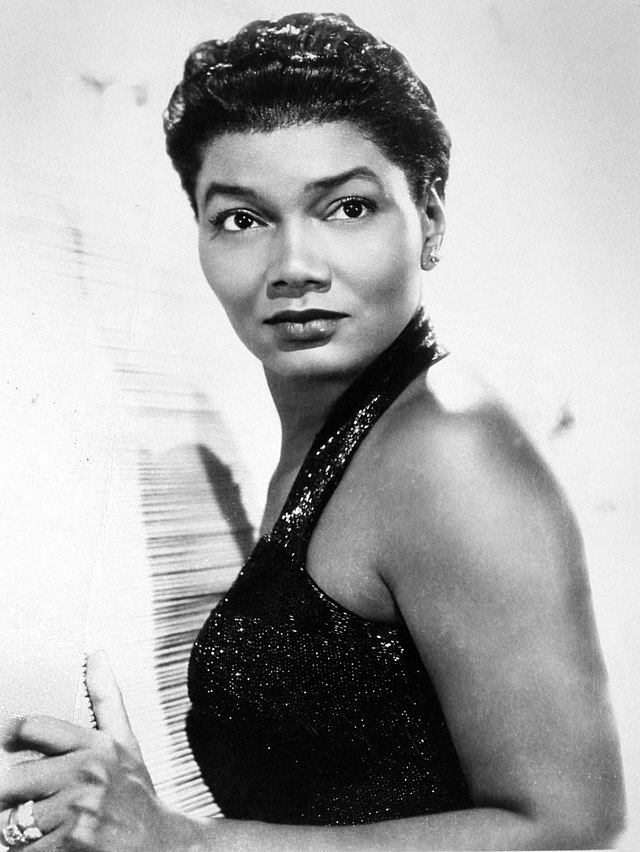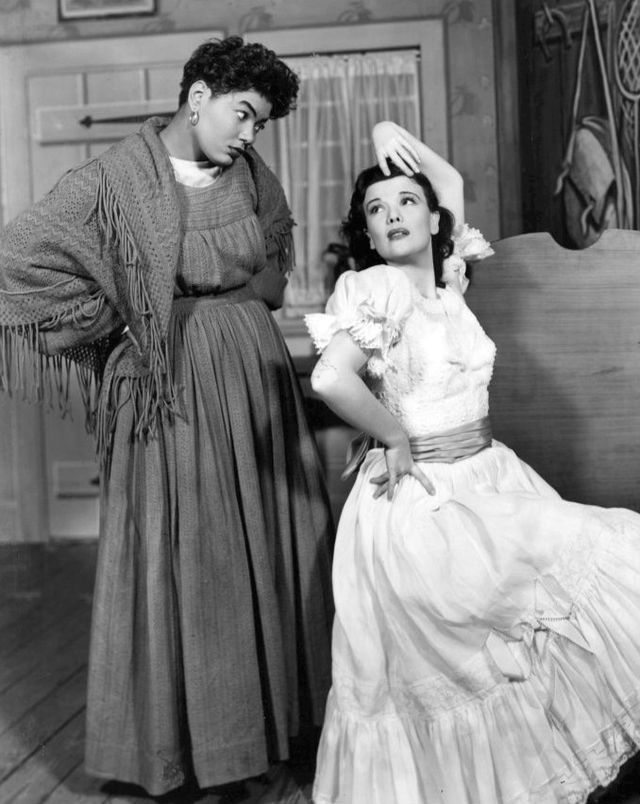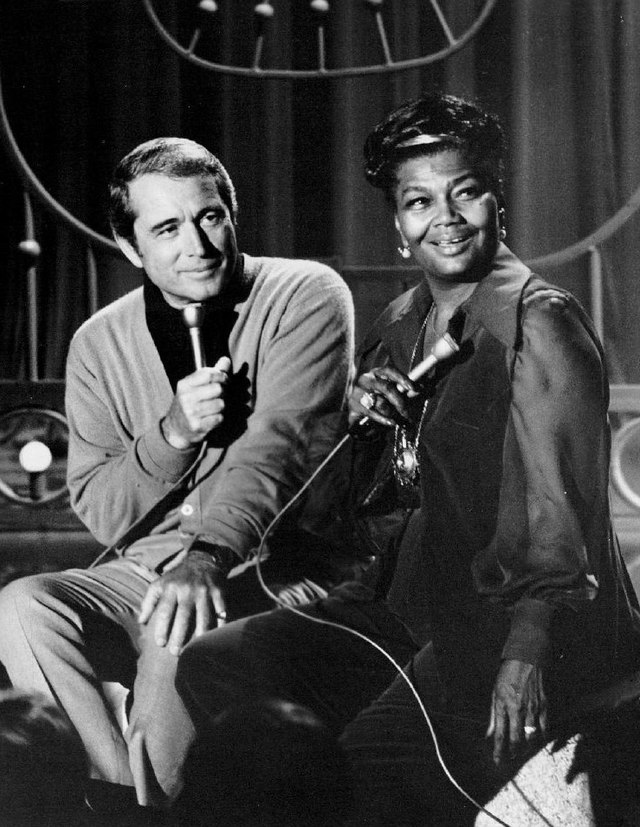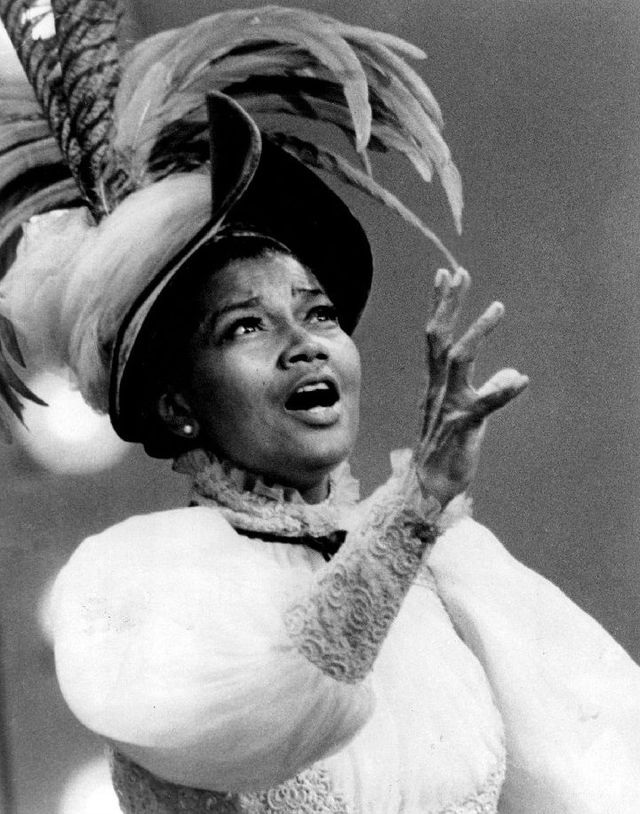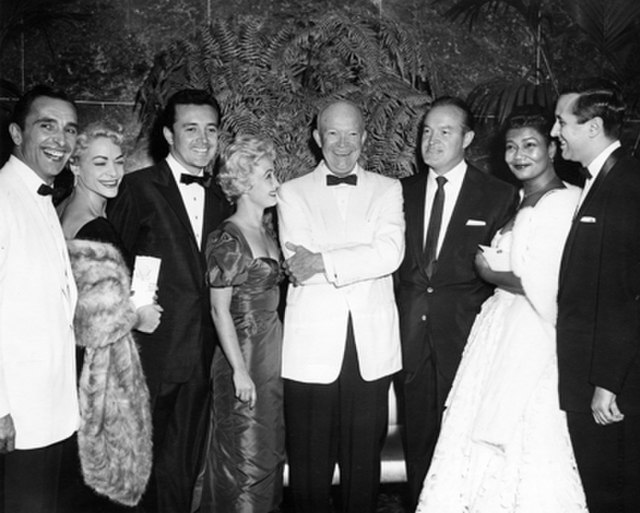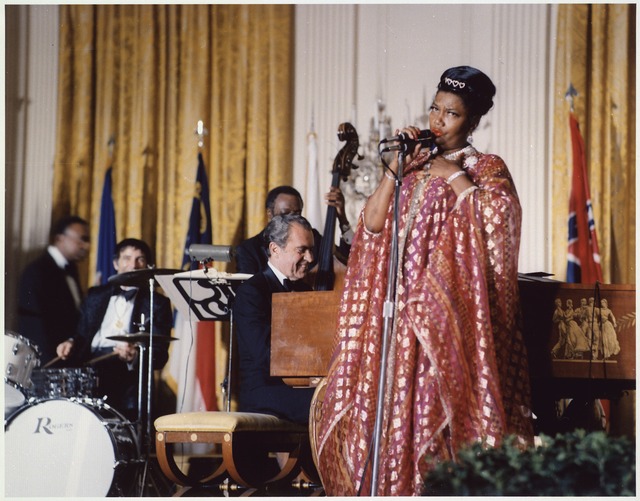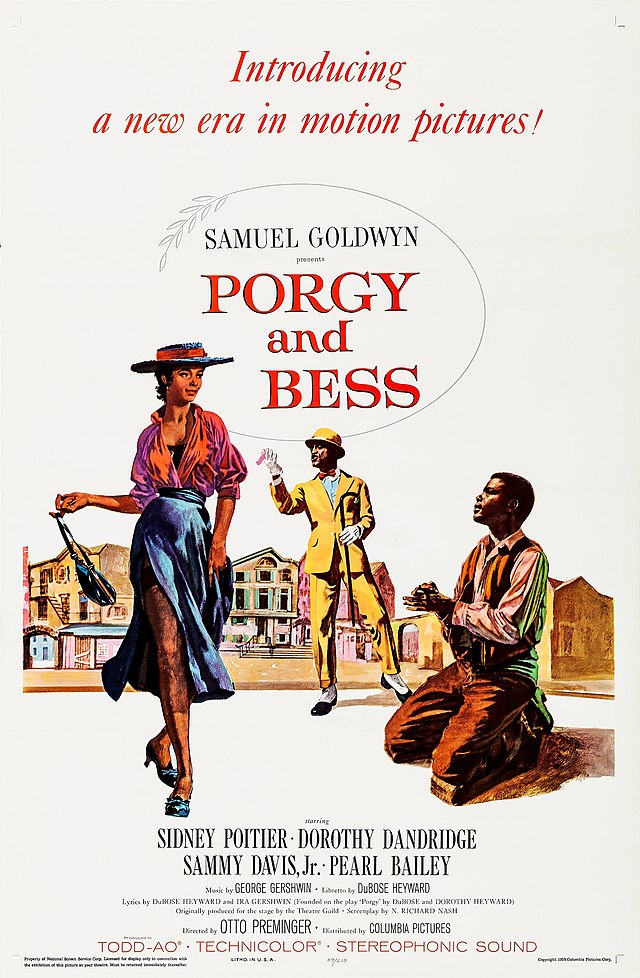Pearl Bailey
back| Full Name | Pearl Mae Bailey |
| Stage Name | Pearl Bailey |
| Born | March 29, 1918 |
| Birthplace | Newport News, Virginia, USA |
| Died | August 17, 1990 |
| Buried | Rolling Green Memorial Park, West Chester, Pennsylvania, USA |
| Married to | John Randolph Pinkett (m. 1948–1952; divorced) - Louie Bellson (m. 1952–1990; her death) |
| Children | Tony Bellson (adopted son) - Dee Dee Bellson (adopted daughter) |
| Notable films | Carmen Jones (1954) - St. Louis Blues (1958) - Porgy and Bess (1959) - All the Fine Young Cannibals (1960) - The Landlord (1970) |
Pearl Bailey
Pearlie Mae
Pearl Bailey (1918–1990) was a renowned American actress, singer, and entertainer known for her charismatic performances and warm personality.
Bailey's big break came with her Broadway debut in "St. Louis Woman" (1946), leading to her iconic role as Dolly Levi in an all-black production of "Hello, Dolly!" (1967), for which she won a special Tony Award. She also starred in films like "Carmen Jones" (1954) and "Porgy and Bess" (1959). Beyond entertainment, Bailey was appointed as a United Nations Goodwill Ambassador in 1975 and received the Presidential Medal of Freedom in 1988.
Related
Pearl Bailey (1918 – 1990)
Personal Life and Movie Career
Pearl Mae Bailey was born on March 29, 1918, in Newport News, Virginia, into a family that was deeply rooted in the church. Her father, Joseph James Bailey, was a preacher, and her mother, Ella Mae Ricks Bailey, was a devout Christian homemaker. Growing up, Pearl was surrounded by the influence of gospel music and the strong sense of community that the church provided. This environment nurtured her love for singing and performing from a very young age.
Bailey's early life was marked by a blend of joy and struggle. Her father’s vocation as a preacher meant that the family often moved, living in different cities. This itinerant lifestyle exposed Bailey to various communities and music styles, shaping her eclectic taste in music. Despite the instability, Pearl found solace in singing, often performing in church. Her natural talent was evident, and by the time she was a teenager, she had started performing at local clubs in Philadelphia and Newport News.
Path Towards Success:
Bailey's big break came during the early 1940s. At a time when vaudeville was a popular form of entertainment, she began performing in the black vaudeville circuit, known as the "chitlin' circuit." Her unique voice, characterized by its sultry, deep timbre, along with her comedic timing, made her a standout performer. Audiences were captivated not only by her vocal prowess but also by her magnetic stage presence. She had a natural ability to engage and charm her audience, often incorporating humor and ad-libs into her performances.
Her talent soon caught the attention of bandleader Cootie Williams, with whom she toured as a featured vocalist. This exposure helped Bailey build a reputation in the music and entertainment industry. In 1946, she made her Broadway debut in the musical "St. Louis Woman," which featured a score by Harold Arlen and Johnny Mercer. Her performance earned her rave reviews, solidifying her status as a rising star.
Bailey's success on Broadway paved the way for her entry into Hollywood. In 1954, she was cast as Frankie in the film adaptation of the musical "Carmen Jones," which starred Dorothy Dandridge and Harry Belafonte. This role brought her to a wider audience and showcased her ability to shine on the silver screen. She continued to appear in various films, including "Porgy and Bess" (1959), in which she played Maria, and "St. Louis Blues" (1958), where she starred alongside Nat King Cole.
Personal Life and Marriages:
Pearl Bailey’s personal life was as vibrant and complex as her public persona. In 1948, she married John Randolph Pinkett, a notable dancer and actor. However, their marriage was short-lived, and they divorced in 1952. Shortly after, Bailey married jazz drummer Louie Bellson. Their union was notable not only because of their shared love for music but also because they were an interracial couple at a time when such relationships were still socially taboo. Despite societal pressures, Bailey and Bellson’s marriage thrived. They remained devoted to each other until Bailey's death in 1990. The couple adopted two children, Tony and Dee Dee Bellson, and created a loving and nurturing family environment.
Passions and Later Life:
Outside of her entertainment career, Pearl Bailey was a woman of many passions. Her strong Christian faith was central to her life, and she often spoke about her beliefs in public appearances and interviews. In the mid-1970s, she took a step back from her entertainment career to focus on other interests. In 1985, she achieved a significant personal milestone by earning a Bachelor’s degree in theology from Georgetown University at the age of 67. Bailey’s intellectual curiosity and commitment to her faith were defining aspects of her character.
Bailey was also known for her work as a humanitarian. In 1975, President Gerald Ford appointed her as a special ambassador to the United Nations, a role in which she served with great pride. Her diplomatic work, along with her position as a prominent African American entertainer, allowed her to advocate for civil rights and social justice.
Throughout her career, Bailey received numerous accolades, including a Tony Award for her role in an all-black production of "Hello, Dolly!" in 1968. Her contributions to the arts were recognized with the Presidential Medal of Freedom, awarded by President Ronald Reagan in 1988.
Death and Cause of Death:
On August 17, 1990, Pearl Bailey passed away at the age of 72 due to arteriosclerosis, a condition characterized by the thickening and hardening of the walls of the arteries, which can lead to cardiovascular complications. She died in Philadelphia, Pennsylvania, leaving behind a legacy of joy, resilience, and trailblazing achievements in the entertainment industry. She was laid to rest at Rolling Green Memorial Park in West Chester, Pennsylvania.
Pearl Bailey's legacy transcends her contributions to music, film, and theater. She was a trailblazer who broke racial barriers and paved the way for future generations of African American performers. Her charisma, humor, and down-to-earth persona made her a beloved figure, not only among her peers but also to the public. Her willingness to speak candidly about her faith, her advocacy for social issues, and her efforts to foster understanding and goodwill between people of different races and backgrounds left an indelible mark on American culture.
Bailey’s voice, filled with warmth and soul, continues to resonate with audiences today. Her performances remain a testament to her talent and her ability to bring people together through music and laughter. Pearl Bailey will always be remembered as a legendary entertainer, a compassionate human being, and a pioneer who helped shape the landscape of American entertainment.
Pearl Bailey on the Ed Sullivan Show:
Authentic Acting by Pearl Bailey
Pearl Bailey's acting style was distinctive and memorable, marked by her unique blend of humor, warmth, and authenticity. She brought a natural charisma to her roles that resonated with audiences, making her a beloved figure in film, theater, and television.
Effortless Charisma and Stage Presence:
Pearl Bailey had a natural charisma that was evident in every performance. Her presence on screen or stage was magnetic, drawing audiences in with ease. This effortless charm made her an engaging performer, whether she was playing a leading role or a supporting character. Her ability to connect with her audience stemmed from her genuine personality; she came across as approachable and relatable, which made viewers feel as though they knew her personally. This quality transcended her performances, turning her into a beloved entertainer not just for her talent but for her persona.
Humor and Comedic Timing:
Humor was one of Pearl Bailey's strongest suits. She had an exceptional sense of comedic timing, which allowed her to deliver lines with a natural wit and spontaneity. Her comedic style was often understated, relying on subtle facial expressions, a raised eyebrow, or a perfectly timed pause to elicit laughter. Bailey's humor was never forced; it felt organic and flowed naturally from her character, making her performances feel authentic and effortless. She had the ability to make audiences laugh while still maintaining the integrity and realism of her character.
Musicality and Vocal Expression:
As a performer with a strong background in music, Pearl Bailey often brought a musical quality to her acting. Her voice was a powerful tool in her acting repertoire, characterized by its deep, rich tone and soulful quality. Bailey could convey a wide range of emotions through her vocal delivery, using rhythm and tone to enhance her dialogue. This musicality added an extra layer to her performances, making them more dynamic and expressive. Her ability to seamlessly integrate song and dialogue was especially evident in her roles in musicals, where her singing often felt like a natural extension of her spoken lines.
Warmth and Nurturing Quality:
Bailey's performances were infused with a sense of warmth and nurturing, qualities that made her particularly effective in maternal or mentoring roles. Characters like Maria in "Porgy and Bess" or Aunt Hagar in "St. Louis Blues" showcased her ability to embody a caring and protective figure. Her portrayals of these characters were grounded in a sense of empathy and understanding, making them feel real and relatable. This warmth made her characters more than just figures on a screen; they became people the audience could connect with and care about.
Authenticity and Relatability:
Pearl Bailey's acting style was marked by its authenticity. She had a way of portraying characters that felt genuine, as if she was not just acting a part but truly inhabiting the character's skin. This authenticity allowed her to play a wide range of roles, from wisecracking friends to strong, supportive figures, with equal believability. Her performances often reflected her own down-to-earth personality, making her relatable to a broad audience. Bailey never appeared to be putting on airs; she seemed real and grounded, which endeared her to viewers.
Adaptability and Versatility:
While Pearl Bailey was often associated with musical roles due to her background as a singer, she was also a versatile actress capable of performing in a variety of genres. She could seamlessly transition from comedy to drama, adapting her style to fit the tone of the film or play. In comedies, she brought humor and lightness, while in dramas, she could convey depth and emotional intensity. This versatility allowed her to take on a wide range of roles, showcasing her ability to adapt to different characters and storytelling styles.
Connection with Co-Stars:
Bailey was known for her ability to create chemistry with her co-stars. She had a way of bringing out the best in those she worked with, making their interactions on screen feel natural and spontaneous. Her warm and welcoming demeanor often made her a favorite among her peers, and this translated into the on-screen relationships she portrayed. Whether playing a friend, confidante, or adversary, Bailey's interactions were marked by a genuine connection, enhancing the believability of the scenes.
Use of Improvisation:
Bailey was known for her ability to improvise, often adding her own ad-libs and personal touches to the dialogue. Her quick wit and sharp mind allowed her to think on her feet, which made her performances feel fresh and spontaneous. This improvisational skill added a unique flair to her roles, as she could seamlessly integrate humor and personal commentary into her character's lines, often catching her co-stars off guard and delighting audiences with unexpected moments of levity.
Pearl Bailey's acting style was a rich tapestry woven from her innate charisma, comedic talent, musical background, and genuine warmth. Her ability to connect with audiences, coupled with her authentic portrayals of a wide range of characters, made her a standout performer. Bailey's legacy is not just in the roles she played but in the way she played them—bringing joy, humor, and heart to each performance. She remains an iconic figure in the world of entertainment, remembered for her extraordinary ability to bring her characters to life with honesty, humor, and grace.
Personal Quotes by Pearl Bailey:
· "You never find yourself until you face the truth."
This quote reflects Bailey’s belief in the importance of self-awareness and honesty. She often spoke about the value of facing reality and understanding oneself as a key to personal growth.
· "What the world really needs is more love and less paperwork."
Bailey’s humorous take on bureaucracy and the human need for genuine connection. This quote captures her straightforward, practical perspective on life.
· "There is a period of life when we swallow a knowledge of ourselves and it becomes either good or sour inside."
Here, Bailey touches on the importance of self-acceptance and the internal processing of our self-image, emphasizing how it shapes our inner state.
· "People see God every day, they just don't recognize him."
This spiritual insight from Bailey reflects her deep religious faith and belief in finding the divine in everyday life.
· "I don't care what you do for a living. If you love it, you are a success."
Bailey was a strong advocate for following one's passion. This quote encapsulates her belief that success is defined by personal fulfillment rather than external measures.
· "There are two kinds of talent, man-made talent and God-given talent. With man-made talent you have to work very hard. With God-given talent, you just touch it up once in a while."
This quote reflects Bailey’s acknowledgment of natural talent and the need for hard work, blending her humor with a touch of humility.
· "Everybody wants to do something to help, but nobody wants to be the first."
Bailey’s observation of human nature points to the hesitation people often feel in taking the initiative, yet their underlying desire to contribute.
· "You must change in order to survive."
This quote shows Bailey’s recognition of the necessity of adaptability and resilience, both in life and in her career.
· "Sometimes you think the whole world is falling apart, but it's only falling into place."
A reflection on perspective, this quote captures Bailey’s optimistic outlook, encouraging a view of challenges as opportunities for things to come together.
· "A man without ambition is dead. A man with ambition but no love is dead. A man with ambition and love for his blessings here on earth is ever so alive."
Bailey emphasizes the importance of balancing ambition with love and gratitude, suggesting that true fulfillment comes from appreciating life’s blessings.
What Others said about Pearl Bailey
Louis Bellson (husband and jazz drummer):
- "She was a beautiful person, a tremendous talent, a fabulous mother, and a beautiful wife. You can't ask for more."
- Louis Bellson, Bailey’s second husband, often spoke of her with deep affection and admiration. Their marriage was a testament to their mutual respect and love, and Bellson frequently highlighted her warmth and caring nature both in their personal life and her public persona.
President Ronald Reagan:
- "She was not only a talented entertainer but a person of deep faith, strong convictions, and a good friend. She will be missed by all who had the privilege of knowing her."
- President Reagan made these comments after awarding Pearl Bailey the Presidential Medal of Freedom in 1988. His words reflect Bailey's impact not just as an entertainer but also as a person of character and conviction.
President Gerald Ford:
- "Her life and her work have touched the hearts of people around the world, and her spirit has brought us all a little closer together."
- President Ford recognized Bailey's contributions to promoting goodwill and understanding when he appointed her as a special ambassador to the United Nations in 1975. His statement captures her role in bridging cultural and social divides.
Truman Capote (Author):
- "She's like an ambassador of good feeling to the world."
- Capote's words highlight Bailey's infectious warmth and the positive influence she had on those around her. He recognized her ability to make people feel good through her presence and personality.
Lena Horne (singer and actress):
- "Pearl was a dear friend, and there wasn't a soul who didn't love her. Her humor, her way of just being herself, made you feel like you were with a real person, someone who was honest and fun."
- Lena Horne, a fellow trailblazer in the entertainment industry, appreciated Bailey's authenticity and the joy she brought to her relationships. Horne's comments reflect the deep friendship and mutual respect between the two.
Sammy Davis Jr. (singer and actor):
- "Pearl had this way of making you feel like you were the most important person in the room. She was a generous performer and a kind-hearted soul."
- Sammy Davis Jr., one of Bailey’s contemporaries in the world of entertainment, admired her ability to make others feel special. His words speak to her generosity both on and off stage.
Carol Channing (actress and singer):
- "When Pearl stepped into 'Hello, Dolly!' it wasn't just a performance, it was a celebration. She brought such life and spirit to the role, and everyone loved her for it."
- Carol Channing, the original Dolly Levi in "Hello, Dolly!", recognized how Pearl Bailey made the role her own in the all-black production. Channing's tribute highlights Bailey's unique talent and the energy she brought to the show.
Richard Nixon (former U.S. President):
- "Pearl Bailey was a remarkable woman whose talents extended beyond the stage. She was a friend to many and an example of grace and dignity."
- Richard Nixon acknowledged Bailey's influence beyond her artistic achievements, pointing to her personal qualities and the respect she commanded across different sectors of society.
Maya Angelou (poet and author):
- "Pearl Bailey was the kind of performer who could touch your soul with a song and then make you laugh in the same breath. She had a rare gift."
- Maya Angelou, renowned for her own contributions to literature and the arts, recognized Bailey's unique ability to connect emotionally with her audience, highlighting her versatility and talent.
Arlene Dahl (actress):
- "She had a natural ease about her, on stage and in life. Pearl made you feel like you belonged, like you were part of her family."
- Arlene Dahl’s comments emphasize Bailey’s inclusivity and her gift for making others feel welcome and valued, both as an entertainer and as a friend.
Awards and Recognition:
Tony Awards
- Special Tony Award (1968): Pearl Bailey received a Special Tony Award for her performance as Dolly Levi in an all-black production of the musical "Hello, Dolly!" Her portrayal of Dolly was critically acclaimed, and the production was a major success, running for over a year. Bailey's unique style and charm brought a fresh perspective to the iconic role, earning her this prestigious recognition.
Emmy Awards
- Emmy Nomination: Bailey received an Emmy nomination for her television work. While she did not win, her contributions to television, including hosting "The Pearl Bailey Show" and appearing on various other programs, were significant in showcasing her versatility and broad appeal.
Grammy Awards
- Grammy Award for Best Spoken Word Recording (1976): Pearl Bailey won a Grammy for her spoken word album "Pearl's Pearls." The album featured Bailey’s reflections, anecdotes, and insights, delivered in her characteristic engaging and humorous style. This award highlighted her talents beyond singing and acting, recognizing her as a storyteller and speaker.
Screen Actors Guild Life Achievement Award
- SAG Life Achievement Award (1976): Pearl Bailey was honored with the Screen Actors Guild Life Achievement Award for her outstanding career achievements and humanitarian efforts. This award is given to actors who demonstrate the finest ideals of the acting profession, and Bailey’s career and personal life embodied these ideals.
Presidential Medal of Freedom
- Presidential Medal of Freedom (1988): Pearl Bailey was awarded the Presidential Medal of Freedom by President Ronald Reagan. This is one of the highest civilian honors in the United States, recognizing individuals who have made significant contributions to the national interests of the country, world peace, or other significant public or private endeavors. Bailey was recognized for her contributions to the arts, her efforts in promoting racial equality, and her work as a United Nations Goodwill Ambassador.
United Nations Special Ambassador
- United Nations Goodwill Ambassador (1975): Pearl Bailey was appointed as a special ambassador to the United Nations by President Gerald Ford. In this role, she represented the United States at various international events, using her influence and popularity to promote peace and understanding. Bailey’s work as a Goodwill Ambassador demonstrated her commitment to humanitarian causes and global harmony.
Kennedy Center Honors
- Kennedy Center Honors (1986): Pearl Bailey was recognized at the Kennedy Center Honors for her contributions to American culture through the performing arts. The Kennedy Center Honors celebrate the careers of individuals who have significantly impacted American culture, and Bailey’s achievements in music, theater, and film made her a deserving recipient.
Honorary Degrees and Academic Recognition
- Georgetown University: In 1985, Bailey earned a Bachelor’s degree in theology from Georgetown University, demonstrating her commitment to lifelong learning and her deep interest in spirituality and education.
- Honorary Doctorate: Bailey received honorary degrees from several institutions, including an honorary Doctor of Humane Letters from Georgetown University, recognizing her contributions to the arts and her philanthropic efforts.
Other Recognitions
- Hollywood Walk of Fame: Pearl Bailey has a star on the Hollywood Walk of Fame, located at 7080 Hollywood Boulevard. This star commemorates her achievements in the entertainment industry and her lasting impact on Hollywood.
- NAACP Image Awards: Throughout her career, Bailey received several recognitions from the NAACP for her outstanding contributions to the arts and her efforts in promoting civil rights and equality.
- Ebony Magazine Awards: Bailey was frequently featured and honored in Ebony magazine, a leading publication for African American culture and achievements, highlighting her role as a trailblazer and icon within the community.
Legacy and Posthumous Recognitions
- Pearl Bailey's Name on Broadway: The theater community honored Bailey’s legacy by including her name in various awards and tributes, celebrating her impact on Broadway and the performing arts.
- Inductions into Halls of Fame: Posthumously, Pearl Bailey has been inducted into various halls of fame recognizing African American achievements and contributions to the performing arts.
Movies featuring Pearl Bailey:
1948: Isn't It Romantic?
- Synopsis: A lighthearted musical comedy set in post-Civil War America, the film follows three sisters who move to Indiana. Bailey appears as Addie, a servant in the household of one of the main characters. The film is a classic example of the musical genre of the late 1940s, filled with romance and humor.
1954: Carmen Jones
- Synopsis: This musical film is an adaptation of the famous opera "Carmen" by Georges Bizet, set during World War II with an all-black cast. Pearl Bailey plays Frankie, a friend of Carmen, who is a vivacious and witty factory worker. The film tells the story of Carmen Jones, a seductive factory worker, and the tragic love affair she has with a soldier named Joe. Pearl Bailey's role as Frankie adds humor and liveliness to the film.
1955: That Certain Feeling
- Synopsis: A comedy film about a cartoonist who returns to his former job to get revenge on his boss by making a comic strip about him. Pearl Bailey plays the role of a maid named Miss Feeney. The film blends slapstick humor with romantic elements, and Bailey's character provides comedic relief.
1958: St. Louis Blues
- Synopsis: This biographical film focuses on the life of legendary blues musician W.C. Handy, portrayed by Nat King Cole. Pearl Bailey plays Aunt Hagar, a pivotal character in Handy's life who supports him through his struggles and encourages his music career. The film showcases the development of Handy's career and the cultural impact of blues music.
1959: Porgy and Bess
- Synopsis: Based on the opera by George Gershwin, "Porgy and Bess" is set in the fictional African American community of Catfish Row in Charleston, South Carolina. Pearl Bailey plays Maria, a strong-willed and protective resident who often stands up to the troublemakers in the community. The film tells the tragic love story of Porgy, a disabled beggar, and Bess, a woman with a troubled past. Bailey's portrayal of Maria adds depth to the community dynamics portrayed in the film.
1960: All the Fine Young Cannibals
- Synopsis: A drama film exploring themes of ambition, love, and betrayal, it tells the story of musician Chad Bixby, played by Robert Wagner, and the complex relationships he navigates. Pearl Bailey plays Ruby, a character who is a friend and confidante to the main characters. The film dives into the lives of aspiring musicians and their struggles with fame and personal demons.
1967: The Fox
- Synopsis: A drama based on the novella by D.H. Lawrence, this film is set on a secluded Canadian farm where two women live. The film introduces tension when a man enters their lives. Pearl Bailey plays the role of the Narrator, lending her voice to the film's storytelling, which is filled with underlying themes of isolation, gender dynamics, and psychological intrigue.
1970: The Landlord
- Synopsis: This comedy-drama film tells the story of Elgar Enders, a privileged young man who decides to buy a tenement building in a black neighborhood in New York City, with intentions of evicting the tenants. However, as he becomes involved in their lives, he undergoes personal transformation. Pearl Bailey plays Marge, the mother of a young man living in the tenement, adding depth and warmth to the film’s exploration of racial and social issues.
1976: Norman... Is That You?
- Synopsis: This comedy film revolves around a father, Ben Chambers, who discovers his son is gay and his subsequent struggle to come to terms with it. Pearl Bailey plays the role of Beatrice Chambers, Ben's wife, who provides a more understanding and compassionate perspective. The film uses humor to address societal views on homosexuality and the generational divide.
1978: Tubby the Tuba
- Synopsis: An animated musical film in which Pearl Bailey provides the voice for Ms. Frog. The film tells the story of Tubby, a tuba who wants to play melodies rather than just background bass notes. It is a charming tale about finding one’s unique voice and place in the world. Bailey’s voice adds a rich, soulful quality to the character she portrays.
1979: All-Star Fiesta (TV Movie)
- Synopsis: This television special celebrated Latin music and its impact on American culture. Pearl Bailey appeared as herself, performing and engaging with other entertainers. The program featured a variety of musical performances and was a tribute to the diversity of musical influences.
1980: The Member of the Wedding (TV Movie)
- Synopsis: Based on the novel by Carson McCullers, this TV movie adaptation focuses on a young girl, Frankie Addams, and her emotional struggles with growing up. Pearl Bailey plays the role of Berenice Sadie Brown, the family's African American cook, who serves as a maternal figure and voice of wisdom for the young protagonist. Bailey's performance brings depth to the story's exploration of race, identity, and adolescence.
1982: Peter and the Magic Egg (TV Movie)
- Synopsis: This animated Easter special tells the story of a young boy, Peter, and his adventures with a magical egg. Pearl Bailey provides the voice for the character Gwendolyn, a motherly figure who helps guide Peter. The film is a family-friendly tale with themes of kindness, courage, and the magic of belief.
1984: The Blue Yonder (TV Movie)
- Synopsis: This fantasy film follows a young boy who travels back in time to help his great-grandfather, a pilot, prevent a tragic accident. Pearl Bailey plays the character Mrs. Lee, who provides wisdom and guidance. The film is a heartwarming story that combines elements of adventure and the importance of family legacy.

